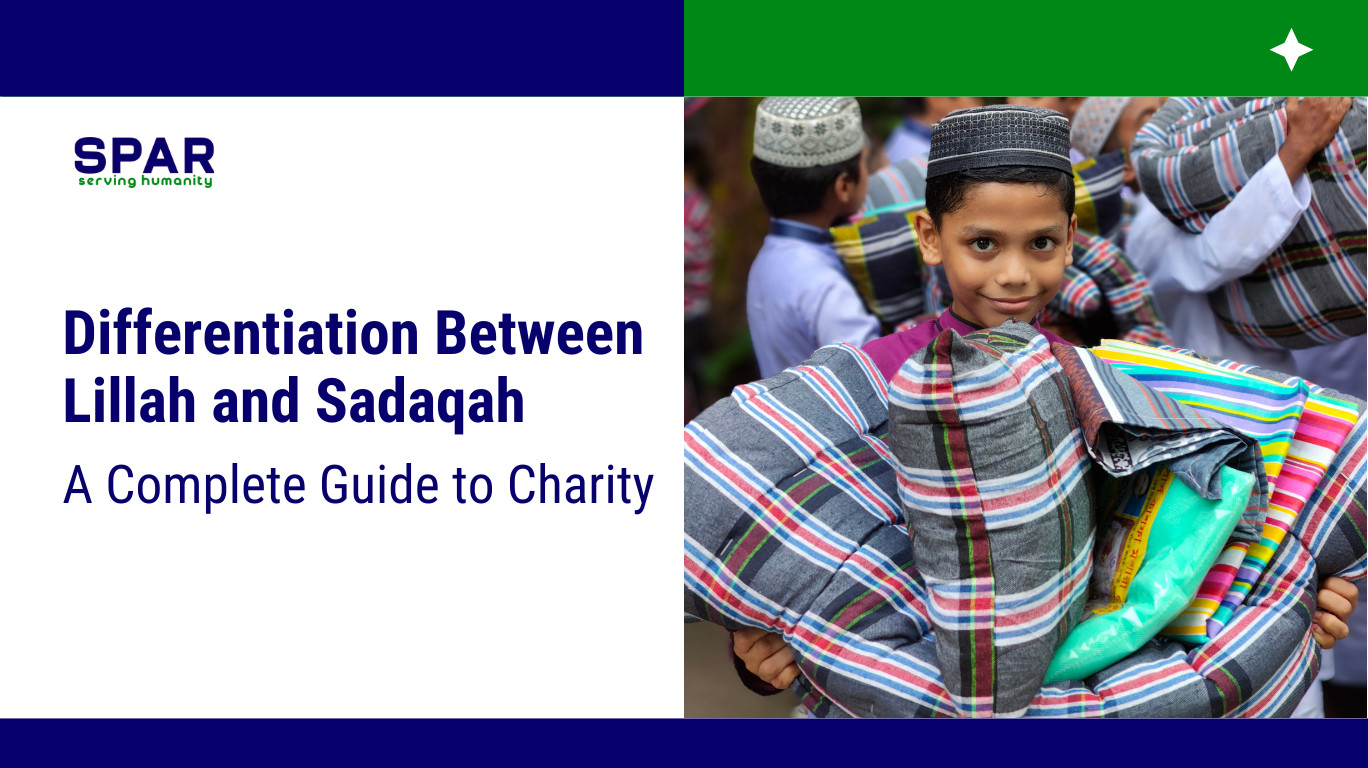Difference between sadaqah and lillah: A Complete Guide to Charity
Assistance is one of Islam’s essential practices. It motivates the medical god, using and helping the doers where needed. Several types of charity exist, but Sadaqah and Lillah excel as optional forms of generosity. Though they have comparable objectives, their purposes and uses are distinct.
Sadaqah centers on assistance, such as acts of kindness or cash for people. On the other hand, lillah funds projects and institutions within Islam. By learning, difference between sadaqah and lillah, Muslims learn to give in a manner consistent with their intent.
This guide has been compiled to unpack these types of giving, explore their significance, and describe how you can put them into practice so your generosity is well-placed.
What is Sadaqah?
- Meaning of Sadaqah
Sadaqah is a freewill donation made for Allah’s sake. It can involve money and the smallest acts, such as a smile, guidance, or assistance.
- Purpose of Sadaqah
Sadaqah cleanses both wealth and the heart. It is a form of thanking Allah and aiding those in need.
- Who Benefits From Sadaqah?
Sadaqah is for all Muslims and non-Muslims, rich or poor—anyone can receive It. You give it away to everyone who may need it.
What is Lillah?
- Meaning of Lillah
Lillah means “for Allah.” It is a charity in the spread of seeking Allah’s pleasure. Lillah is typically given in support of Islamic causes like building mosques or schools, which differs from Sadaqah.
- Purpose of Lillah
Lillah is for projects that benefit the greater Muslim community. It aims to develop the society and spread Islamic teachings.
- Who Benefits From Lillah?
Lillah is normally applied to institutions or initiatives rather than just people. It helps fund long-lasting projects such as orphanages or wells.
Key Differences Between Sadaqah and Lillah:
| Aspect | Sadaqah | Lillah |
| Definition | Voluntary charity for any cause. | Charity for Islamic projects. |
| Recipients | Individuals in need. | Mosques, schools, or community projects. |
| Purpose | To help people and purify wealth. | To support Islamic development. |
| Examples | Food, money, clothes, or kind acts. | Funding a mosque or water well. |
Examples of Sadaqah
- Purchasing food for a neighbour who is short on funds
- With handing me down clothes,
- A smile to a stranger or some comforting words.
- He was assisting a pal with his work or studies.
Examples of Lillah
- Donate to build a mosque.
- It is funding Islamic institutions or libraries that teach Islam.
- Donating-charity-to-an-orphanage-or-hospital-which-run-by-islamic_charities
- Making payments for running costs of a madrasa or community centre
Why Give Sadaqah?
- To Purify Wealth
Sadaqah cleans your heart from greed and selfishness. It cleanses your income and brings you blessings.
- To Earn Allah’s Mercy
As stated in the Quran, practising charity multiplies your rewards and mercy from Allah. Every form of Sadaqah, no matter how small, is equally valuable.
- To Protect Against Hardships
The Prophet Muhammad (peace be upon him) says, “Sadaqah extinguishes sins as water extinguishes fire” (Tirmidhi). It protects you from harm and calamity.

Why Give Lillah?
- To Support the Community
It supports the Muslim community in several communities by funding various projects, such as mosques and schools that serve generations.
- To Gain Ongoing Rewards
Giving Lillah is part of Sadaqah Jariyah (continuous charity). As long as the work/project you support helps people, you will continuously gain blessings.
- To Seek Allah’s Pleasure
Lillah is purely for Allah; hence, it develops a sense of taqwa in you because the act was done only out of love for Him.
How to Give Sadaqah
- Start Small
AL-Mauna means anything good, like providing help to someone in need, so every good deed counts as Sadaqah—including sharing food or kind words.
- Make it Regular
Make regular contributions, even if they are minimal. Allah likes عمل (deeds) done regularly.
- Help Those Around You
Start close and see if there are people in your inner circle—local friends or co-workers you interact with—who could use help!
How to Give Lillah
- Choose a Project
Find a cause that reflects your values. This could also be a mosque, perhaps funding a well or supporting an orphanage.
- Pair Up with the Right Organizations
Contribute alongside Authentic Islamic Charities Only
- Focus on Sustainability
Help fund things you believe will benefit the community for years.
Final Thought: Difference between sadaqah and lillah
Understanding the distinction between Sadaqah and Lillah allows you to give with purpose. These two charity styles are indicators of Islam’s ethical structure and have endless rewards. What do you gain through Sadaqah? By giving Sadaqat, you show kindness to those in need directly. Lillah also supports community projects that will benefit numerous individuals over time. All these acts of giving reinforce faith and create communities, spreading hope to the most delicate souls.
Give now, and reap the benefits of helping others for His sake.
How is Sadaqah different from Lillah?
Sadaqah is for aiding needy persons, whereas Lillah is for financing Islamic projects and organizations.
Is it permissible to (give) ‘Sadaqah and Lillah’?
Indeed, you can provide both and support a variety of causes!
Lillah, can it be an individual thing?
No, we reserve Lillah for community or religious needs, not personal support.
Are Zakat, Sadaqah, or Lillah interchangeable?
No, Zakat is compulsory, and Sadaqah or Lillah are both optional.
Can I give anonymously?
Yes, you can.
Which is better, Sadaqah or Lillah?
Both are a must-have but serve different aims. Direct aid falls under Sadaqah, whereas Lillah is to fund more fabulous community work.
Are donations tax-deductible?
Donations are tax-deductible in numerous countries to registered charities. Consult the local tax law in your area.




 Secure
donation
Secure
donation